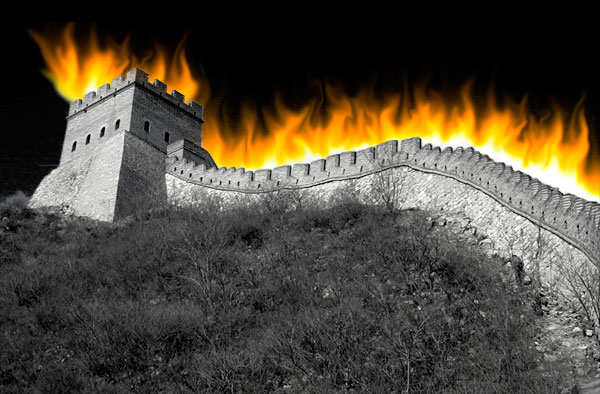China’s Ministry of Industry and Information Technology this week posted a draft revision to the 2004 “Chinese Internet Domain Name Management Rules” which will be online for public comment until April 25. If passed, the new regulations would require all websites to register their domain names with local ISPs and authorities. (See a full English translation at Rogier Creemers’ China Copyright and Media blog.) At The New York Times, Paul Mozur reports on the draft, highlighting its lack of clarity and outlining possible implications:
It was not clear whether the rule would apply to all websites or only to those hosted on servers in China. Chinese laws can be haphazardly enforced and are usually vague, and because the new rule is only a draft, analysts said they expected the regulator, the Chinese Ministry of Industry and Information Technology, to specify later to whom the law would apply.
If the rule applies to all websites, it will have major implications and will effectively cut China out of the global Internet. By creating a domestic registry for websites, the rule would create a system of censorship in which only websites that have specifically registered with the Chinese government would be reachable from within the country.
[…] Other experts, however, said the law would probably apply only to websites hosted in China.
“I think these regulations are about content hosted in China,” said Rogier Creemers, a lecturer on Chinese politics at Oxford University. “It can be that they expand in the future.” He pointed out that if the rules applied to all websites, they would eliminate access overnight to a huge chunk of the Internet.
If the law applies only to sites hosted in China, it would still represent a consolidation of power by Beijing. Forcing registration with Chinese entities is likely to create a new boom in domain-name service registrars. At the moment, Alibaba operates China’s primary domain-name service provider, called Wan Wang. [Source]
The joy of covering China. This law either cuts China from the global Internet w/ huge repercussions or does nothing https://t.co/TRQAmYPjNg
— Paul Mozur 孟建國 (@paulmozur) March 29, 2016
China draft law either cuts off the Internet, makes it harder to host websites in China, or does something else: https://t.co/dsGoDq6p0y
— Paul Mozur 孟建國 (@paulmozur) March 29, 2016
Tech In Asia’s Erik Couch also focused on the draft’s ambiguity, pointing to a Wall Street Journal article which adopts a worst-case scenario reading of the draft: that it could block connections to any domain registered outside of China, allowing domestic users legal access only to websites ending with .cn and .中国:
That’s the reading that many online commenters have taken, and it is also the interpretation that the Wall Street Journal has run with. The paper says the legislation would “effectively wall off the world’s most populous country from vast swaths of the internet.”
[…] But it’s hardly that clear. The law focuses on regulations of “top-level domains” (e.g. .cn/.com/) and it gives Chinese internet service providers the authority to regulate what happens on those domains within their control. Article six of the law states: “‘.cn’ and ‘.中国’ are China’s national top-level domains.”
Some have interpreted the law to mean that Chinese authorities want any .cn address to be officially approved by the nation’s authorities, but that other domains are not affected by the legislation. That’s hardly an open stance to take, but it is substantially less restrictive than outright blocking all domains that haven’t gone through that process.
Even this slightly more optimistic take would wreak havoc on any .cn domain provider not based in the mainland. For example, the world’s biggest domain supplier, GoDaddy, sells .cn domains throughout Asia, especially in Hong Kong and Singapore, but does not actually operate in mainland China. This law could mean that those .cn domains would need to be switched over to domestic Chinese hosts – lest they be blocked by the Great Firewall, which could identify their foreign IP addresses. […] [Source]
The draft comes amid the Xi administration’s steady reinforcement of media and Internet control—the latter known by the official euphemism “Internet management” and often praised by state media. The Global Times’ coverage of the draft regulation describes it as an “unprecedented” effort to “ensure national and ideological security” in line with the recently unveiled 13th Five-Year Plan’s goals for cyberspace:
The Chinese government is stepping up efforts to strengthen management of the Internet with the recent drafting of an “unprecedented” regulation on Internet domain names, observers said.
[…] The draft added that violators can be punished with a penalty of up to 30,000 yuan ($4,628). Their violations will also be announced in public notices and rectifications will be demanded.
[…] “Such a regulation document can only be the start [of legislative efforts in this regard]. A specific law for Internet information management might follow in the future,” Zhu Wei, deputy director of the Communications Law Research Center at the China University of Political Science and Law, told the Global Times on Monday.
Zhu pointed out the regulation is only necessary in the short term to ensure “national security and ideological security.”
[…] Under the 13th Five-Year Plan (2016-20), China pledged to strengthen the precise administration of cyberspace and to build a multilateral, democratic and transparent Internet governance system.
[Source]








